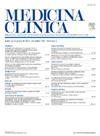Transthyretin stabilizer targeting for transthyretin amyloid cardiomyopathy: A systematic review and meta-analysis
IF 2.1
4区 医学
Q1 MEDICINE, GENERAL & INTERNAL
引用次数: 0
Abstract
Introduction
Transthyretin amyloid cardiomyopathy (ATTR-CM) is a progressive disease caused by cardiac amyloid deposition. Transthyretin stabilizers (TTRS) are a potential treatment, but their efficacy and safety remain uncertain. This study aims to evaluate the effects of TTRS on all-cause mortality, functional capacity, quality of life, and adverse events in ATTR-CM patients.
Methods
A systematic review and meta-analysis was conducted in February 2025 using Cochrane Central, PubMed, and Embase to identify clinical trials and observational studies comparing TTRS versus no-TTRS therapies. Two reviewers independently assessed study eligibility and extracted data. Outcomes were analyzed using odds ratios (OR) and mean differences (MD) with 95% confidence intervals. Heterogeneity was evaluated using I2 statistics, and sensitivity analyses were performed where appropriate. Risk of bias was assessed using ROBINS-I V2 and RoB 2 tools.
Results
Seventeen studies with 5209 participants (2399 TTRS; 2810 controls) were included. TTRS significantly reduced all-cause mortality (OR 0.20; 95% CI 0.11–0.37; p < 0.01). In the tafamidis subgroup, the effect remained significant (OR 0.25; 95% CI 0.13–0.48; p < 0.01). No mortality benefit was observed in groups with mixed tafamidis doses (OR 0.75; 95% CI 0.41–1.38; p = 0.14). TTRS improved quality of life (KCCQ-OS: MD 11.70) and functional capacity (6-minute walk test: SMD 50.68). Fewer adverse events (OR 0.19) and serious events (OR 0.54) were reported, with no difference in severe events.
Conclusion
TTRS, especially tafamidis, reduce mortality and improve outcomes in ATTR-CM.
转甲状腺素稳定剂靶向转甲状腺素淀粉样心肌病:系统回顾和荟萃分析
转甲状腺素淀粉样心肌病(atr - cm)是一种由心脏淀粉样蛋白沉积引起的进行性疾病。甲状腺素稳定剂(TTRS)是一种潜在的治疗方法,但其疗效和安全性仍不确定。本研究旨在评估trs对atr - cm患者全因死亡率、功能能力、生活质量和不良事件的影响。方法于2025年2月使用Cochrane Central、PubMed和Embase进行了一项系统回顾和荟萃分析,以确定比较TTRS与非TTRS治疗的临床试验和观察性研究。两名审稿人独立评估研究资格并提取数据。结果分析采用比值比(OR)和平均差异(MD),置信区间为95%。使用I2统计量评估异质性,并在适当情况下进行敏感性分析。使用ROBINS-I V2和rob2工具评估偏倚风险。结果纳入17项研究,5209名受试者(2399名TTRS, 2810名对照)。TTRS显著降低了全因死亡率(OR 0.20; 95% CI 0.11-0.37; p < 0.01)。在他法底斯亚组中,效果仍然显著(OR 0.25; 95% CI 0.13-0.48; p < 0.01)。混合他法底斯剂量组未观察到死亡率获益(OR 0.75; 95% CI 0.41-1.38; p = 0.14)。TTRS改善了生活质量(KCCQ-OS: MD 11.70)和功能能力(6分钟步行测试:SMD 50.68)。不良事件(OR 0.19)和严重事件(OR 0.54)较少,严重事件无差异。结论ttrs可降低atr - cm患者的死亡率,改善预后。
本文章由计算机程序翻译,如有差异,请以英文原文为准。
求助全文
约1分钟内获得全文
求助全文
来源期刊

Medicina Clinica
医学-医学:内科
CiteScore
3.10
自引率
5.10%
发文量
295
审稿时长
22 days
期刊介绍:
Medicina Clínica, fundada en 1943, es una publicación quincenal dedicada a la promoción de la investigación y de la práctica clínica entre los especialistas de la medicina interna, así como otras especialidades. Son características fundamentales de esta publicación el rigor científico y metodológico de sus artículos, la actualidad de los temas y, sobre todo, su sentido práctico, buscando siempre que la información sea de la mayor utilidad en la práctica clínica.
 求助内容:
求助内容: 应助结果提醒方式:
应助结果提醒方式:


